
Marco Polo was a Venetian merchant, explorer and writer who travelled through Asia along the Silk Road between 1271 and 1295. His travels are recorded in The Travels of Marco Polo, a book that described to Europeans the then-mysterious culture and inner workings of the Eastern world, including the wealth and great size of the Mongol Empire and China in the Yuan Dynasty, giving their first comprehensive look into China, Persia, India, Japan and other Asian cities and countries.

Venice is a city in northeastern Italy and the capital of the Veneto region. It is built on a group of 126 islands that are separated by expanses of open water and by canals; portions of the city are linked by 472 bridges. The islands are in the shallow Venetian Lagoon, an enclosed bay lying between the mouths of the Po and the Piave rivers. In 2020, around 258,685 people resided in greater Venice or the Comune di Venezia, of whom around 51,000 live in the historical island city of Venice and the rest on the mainland (terraferma). Together with the cities of Padua and Treviso, Venice is included in the Padua-Treviso-Venice Metropolitan Area (PATREVE), which is considered a statistical metropolitan area, with a total population of 2.6 million.
Courtesan, in modern usage, is a euphemism for a kept mistress or prostitute, particularly one with wealthy, powerful, or influential clients. The term historically referred to a courtier, a person who attended the court of a monarch or other powerful person.
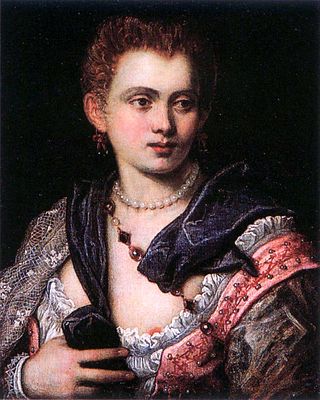
Veronica Franco (1546–1591) was an Italian poet and courtesan in 16th-century Venice. She is known for her notable clientele, feminist advocacy, literary contributions, and philanthropy. Her humanist education and cultural contributions influenced the roles of Courtesans in the late Venetian Renaissance.

La traviata is an opera in three acts by Giuseppe Verdi set to an Italian libretto by Francesco Maria Piave. It is based on La Dame aux camélias (1852), a play by Alexandre Dumas fils adapted from his own 1848 novel. The opera was originally titled Violetta, after the main character. It was first performed on 6 March 1853 at La Fenice opera house in Venice.
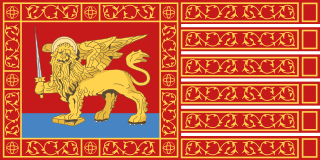
The Republic of Venice or Venetian Republic, traditionally known as La Serenissima, was a sovereign state and maritime republic in parts of the present-day Italian Republic that existed for 1,100 years from 697 until 1797. Centered on the lagoon communities of the prosperous city of Venice, it incorporated numerous overseas possessions in modern Croatia, Slovenia, Montenegro, Greece, Albania and Cyprus. The republic grew into a trading power during the Middle Ages and strengthened this position during the Renaissance. Most citizens spoke the Venetian language, although publishing in Italian became the norm during the Renaissance, alongside Latin and Medieval Greek.

The Venetian Ghetto was the area of Venice in which Jews were forced to live by the government of the Venetian Republic. The English word ghetto is derived from the Jewish ghetto in Venice. The Venetian Ghetto was instituted on 29 March 1516 by decree of Doge Leonardo Loredan and the Venetian Senate. It was not the first time that Jews in Venice were compelled to live in a segregated area of the city. In 1555, Venice had 160,208 inhabitants, including 923 Jews, who were mainly merchants.

Dangerous Beauty is a 1998 American biographical drama film directed by Marshall Herskovitz and starring Catherine McCormack, Rufus Sewell, and Oliver Platt. Based on the non-fiction book The Honest Courtesan by Margaret Rosenthal, the film is about Veronica Franco, a courtesan in sixteenth-century Venice who becomes a hero to her city, but later becomes the target of an inquisition by the Church for witchcraft. The film features a supporting cast that includes Fred Ward, Naomi Watts, Moira Kelly and Jacqueline Bisset. The film was released as A Destiny of Her Own in some regions, and was retitled The Honest Courtesan for its UK video release.
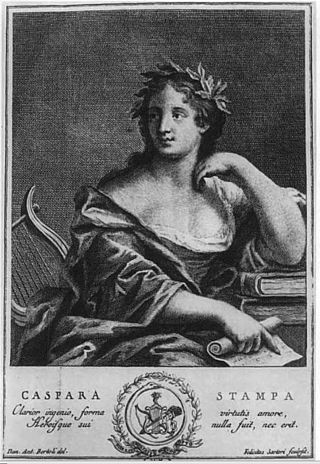
Gaspara Stampa was an Italian poet. She is considered to have been the greatest woman poet of the Italian Renaissance, and she is regarded by many as the greatest Italian woman poet of any age.
The American Music Theatre Project (AMTP) is a project at Northwestern University that associates the faculty and students at Northwestern with professional working artists of the music theatre to develop new musicals. It was founded in 2005.
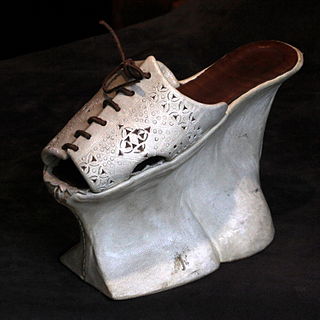
A chopine is a type of women's platform shoe that was popular in the 15th, 16th and 17th centuries. Chopines were originally used as a patten, clog, or overshoe to protect the shoes and dress from mud and street soil.
This list explores the instances of which the city of Venice, Italy, has been mentioned or alluded to in various media.
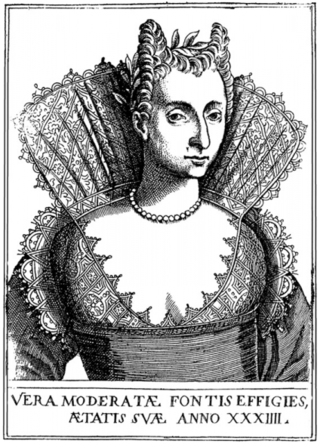
Moderata Fonte, directly translates to Modest Well is a pseudonym of Modesta di Pozzo di Forzi, also known as Modesto Pozzo, (1555–1592) was a Venetian writer and poet. Besides the posthumously-published dialogues, Giustizia delle donne and Il merito delle donne, for which she is best known, she wrote a romance and religious poetry. Details of her life are known from the biography by Giovanni Niccolò Doglioni (1548-1629), her uncle, included as a preface to the dialogue.

The Seven Lamps of Architecture is an extended essay, first published in May 1849 and written by the English art critic and theorist John Ruskin. The 'lamps' of the title are Ruskin's principles of architecture, which he later enlarged upon in the three-volume The Stones of Venice. To an extent, they codified some of the contemporary thinking behind the Gothic Revival. At the time of its publication, A. W. N. Pugin and others had already advanced the ideas of the Revival and it was well under way in practice. Ruskin offered little new to the debate, but the book helped to capture and summarise the thoughts of the movement. The Seven Lamps also proved a great popular success, and received the approval of the ecclesiologists typified by the Cambridge Camden Society, who criticised in their publication The Ecclesiologist lapses committed by modern architects in ecclesiastical commissions.
Lucrezia Marinella (1571-1653) was an Italian poet, author, philosopher, polemicist, and women's rights advocate. She is best known for her polemical treatise The Nobility and Excellence of Women and the Defects and Vices of Men (1600). Her works have been noted for bringing women into the philosophical and scientific community during the late Renaissance.
Alberto Bolognetti (1538–1585) was an Italian law professor, bishop, diplomat, and cardinal. He was appointed by Pope Gregory XIII as a papal nuncio to Florence, Venice, and the Polish–Lithuanian Commonwealth. In that last appointment, he persuaded King Stephen Báthory to adopt the Gregorian calendar. He was promoted to cardinal priest, but died before he could return to Rome for the ceremonies.

Niccolò Sagundino was a Greek-born Venetian secretary, diplomat and humanist. He wrote numerous letters, as well as religious and philosophical treatises, mostly in Latin.
Martha Feldman is an American musicologist and cultural historian. Since 1990 she has taught at the University of Chicago where she is Ferdinand Schevill Distinguished Service Professor in the Department of Music and the College. Feldman also holds appointments to the faculty of Theater and Performance Studies and serves as affiliated faculty in Romance Languages and Literatures and at the Center for the Study of Gender and Sexuality. Born in Philadelphia to a family of artists, she studied at the University of Pennsylvania, where she earned her doctorate in Music History and Theory in 1987. She is married to composer and jazz musician Patricia Barber.
Federico Badoer (1519–1593) was a diplomat of the Republic of Venice whose career was derailed in the 1560s by debts and unauthorized diplomacy.